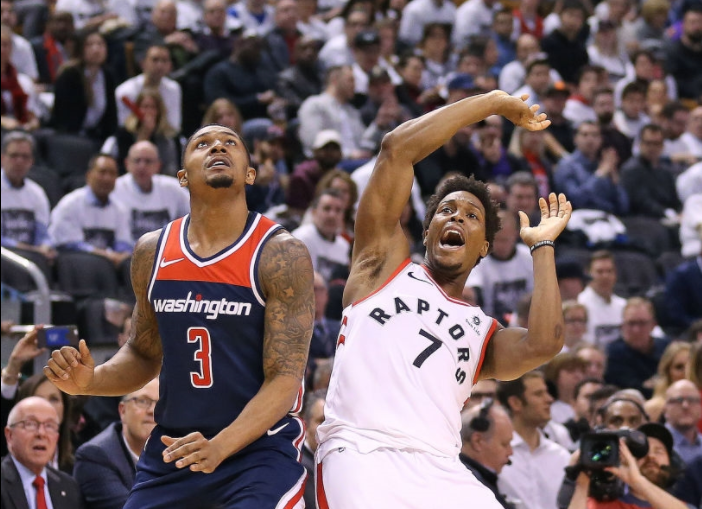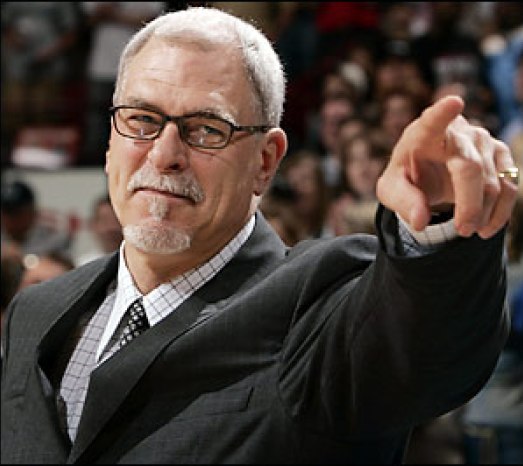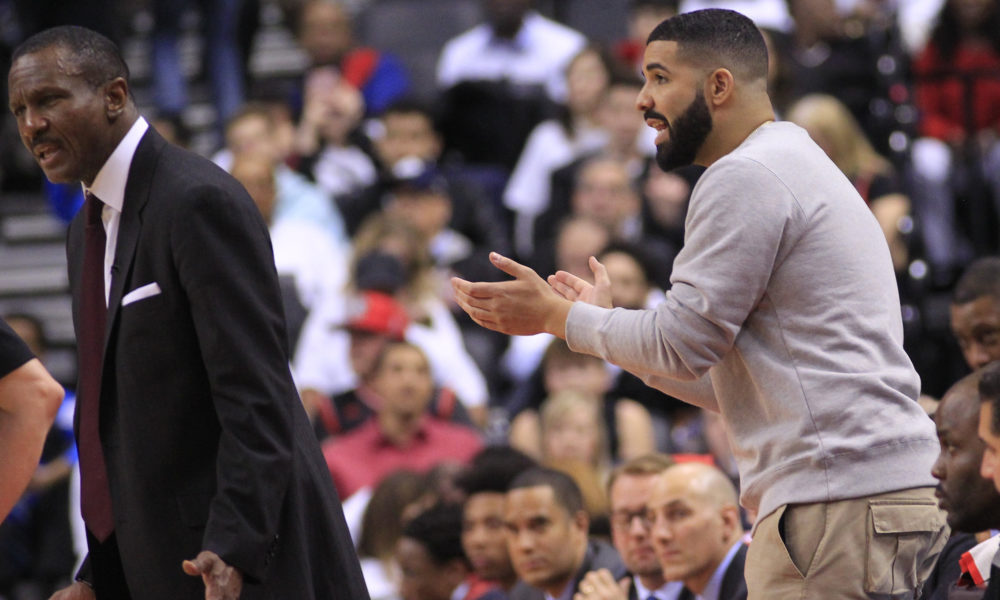The Washington Wizards are not your typical 8-seed. That has been the narrative for much of the series, initially preparing Toronto Raptors fans for what seemed the inevitable worst, but on the other side of the coin serving as concrete evidence of just how good this version of the Raptors is.
The Wizards have two all-stars (one of whom missed 41 games), one of the best 3-and-D players in the league, and a bench that is vastly improved from a season ago (partially due to how poor it was in the first place). They have always been a confident bunch, and trailing the series 0-2 hasn’t changed that.
“I wouldn’t say trouble,” John Wall said when asked if his team was in a bit of a pickle after losing Game 2. “Every series is different; every year is always different in the playoffs. We had a situation where we were up 2-0 going to Atlanta, they took care of home court in that situation. We went to Boston, went down 2-0, came back and took care of what we were supposed to do.”
These are the facts. The Wizards went a perfect 6-0 at the Capital One Arena in the playoffs a year ago. The only other team to go undefeated at home was the Golden State Warriors (9-0). The Boston Celtics were the top seed last season, and after they took a 2-0 series lead against Washington in the Conference Semifinals, the Wizards stormed back to force a Game 7. Barring a completely gassed Wall or an inspired Kelly Olynyk in the fourth quarter, it’s entirely conceivable that they are the ones who would have advanced to the Conference Finals.
Over those six home games, Wall averaged 26.8 points, 10.8 assists, 1.7 steals and a block per game. It’s also worth remembering Washington are yet to lose a first-round series in the Wall-Beal era in three tries. There is no reason to think they will go down without a fight.
Ifs and buts can change perception, but with the Raptors entering unchartered territory, it’s important to be mindful of what the Wizards are still capable of despite the understandable desire to flex. After all, despite the Raptors dropping a franchise-record 44 points in the first quarter of Game 2 and getting Wall and Bradley Beal in early foul trouble, it was still a five-point game in the fourth quarter with the Toronto fan base steadily steering towards a complete meltdown. They held a 91-88 lead with just over 10 minutes remaining in Game 1, too.

The Wizards don’t appear to be the same team at home this season based on their record, but their numbers are fairly similar to last season. Wall’s absence is a difference maker. They were 16-8 in the 24 home games he played, but just 7-10 without him. The Raptors have struggled to keep him out of the paint, with the trusted strategy of bigs dropping on pick-and-rolls only serving to provide a runway for the speedy point guard to reach full tilt.
“How many dribbles did he take to the rim, one dribble, two dribbles to the rim?” Casey asked rhetorically before Game 2. “Straight line drives, we look at that as much as anything. He’s been out for a while, I understand that, but that’s way too many times getting to the rim especially with the amount of dribbles.”
Wall is the leading driver in the playoffs at 25.5 per game with 10.5 field goal attempts resulting from them. The concern for the Wizards is that he’s only finishing 42.9 percent of those shots compared 45.3 percent in last year’s playoffs.
One positive result for the Raptors when they have successfully been able to goad Wall into shooting jumpers by sagging deeper is that he is shooting 3-for-12 on pull-up shots including 0-for-3 on from beyond the arc. This is consistent with his regular season mark of 29.8 percent shooting on 7.7 pull-up jumpers per game, and so it’s easy to understand why Toronto is rolling with this strategy.
An area where Washington may look to aid their star point guard is at the center position, by giving him more room to work with inserting Mike Scott into the starting five to replace a struggling Marcin Gortat. Scott has been a revelation off the bench thus far, averaging 17 points per game while knocking down 70 percent of his shots from the field and 4-of-5 shooting from deep in Game 2.
After struggling with courtesy of early foul trouble in Game 1, Gortat put up a complete dud in Game 2 with zero points and three rebounds, missing all four of his shots from the field. This move would also allow the Wizards to test how Jonas Valanciunas fairs against a more perimeter oriented player, and so now Casey’s strategy to have the bigs drop would also need to be reconsidered.
For Toronto, they haven’t been here before. A 2-0 series lead, though comforting, seems a bit jarring for a franchise so accustomed to adversity in the postseason. DeMar DeRozan has thrived through the criticism of being the archaic figure whose game could never pass the analytics test, while the Bench Mob had to earn a fair shake after RPM darling Patrick Patterson made his exit.
They are firmly in the role of favorites at this point, and as Casey alluded to over a conference call on Thursday, they are relishing the role and I wrote a bit about it over at North Pole Hoops as well. Should they be six-point favorites on the road? That’s worth a debate.

They were mostly good outside of Canada this season, but the away win against the Houston Rockets was probably their only signature win. They had opportunities to do so in Boston, Cleveland and Golden State, and failed. Most notably, there were crunch time struggles in each of those games which could potentially rear their ugly head once again.
The assist percentage from the table above is ever so encouraging, and maintaining their ball movement/player movement style in a hostile environment will be a significant development in their process. Kyle Lowry and Delon Wright pushing the pace will be a crucial part of the storyline, as the rest factor has clearly aided the former in doing so through the first two games. Per Cleaning The Glass, Toronto scored 190 points per 100 transition possessions off live rebounds in Game 1, and a still flaming hot 158.3 points per in Game 2.
Carrying over those results to the road will be every bit as crucial to their own offense as it will be to applying pressure to Washington’s backcourt and indirectly slowing down their offensive game. Toronto added 11.4 points per 100 possessions through their transition efforts in Game 1, and another 8.8 points per in Game 2. The Wizards on the other hand added just 1.7 points per 100 in Game 1 and 0.7 points in Game 2.
Finally, another aspect going against the Raptors will be the zig-zag theory. Just as home favorites who lose Game 1 are sent into must-win mode and win 75 percent of Game 2’s, the same concept applies to road underdogs who go down 2-0 in a series. No team has ever come back from an 0-3 deficit in the NBA, and so the desperation that seeps in for such a scenario is a critical factor. Over 60 percent of games are won by the team facing the 0-2 deficit on their home floor, although both the Pelicans and Warriors went against that grain on Thursday.
This will be a stern test as the Raptors continue to validate their championship aspirations and credentials, and beating a team that has historically been more than a handful to deal with in their own building should go a long way toward doing so.



